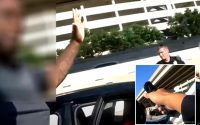Story of Marine, Iraqi interpreter inspired Jake Gyllenhaal to star in Guy Ritchie’s ‘The Covenant’
The head of New York City’s Emergency Management, a former Marine, was contacted by an Iraqi interpreter who received a disturbing threat: a severed dog’s head outside his front door, along with a menacing two-word note: “You’re next.”
The interpreter, Khalid Abood, knew he was doing dangerous work. He and two of his four daughters had been working as translators for the American forces that invaded Iraq in 2003 to overthrow ruthless dictator Saddam Hussein.
But the Godfather-esque warning was something else. So he got in touch with Zachary Iscol, the American Marine and current commissioner of New York City Emergency Management. Abood and Iscol had grown incredibly close during the Second Battle of Fallujah in 2004.
“I told him to just pack up and get out of Iraq,” Iscol told The Post. “Interpreters were being hunted, and were prime targets for insurgent and terrorist groups.”
So Abood and his family fled to Jordan, where they languished until Iscol secured them passage to America.
It was a film-worthy tale.
And in a tremendous bit of irony, it inspired Iscol’s longtime friend – movie star Jake Gyllenhaal – to take the lead role in Guy Ritchie’s new movie, “The Covenant,” which is about an American soldier who goes to great lengths to save an Afghani interpreter who once saved his life.
Iscol and Gyllenhaal had grown up together and remained close over the years.


Gyllenhaal told The Post that hearing Iscol’s story about Abood made him want the role even more.
“Through Zach’s relationship with Abood and his family, I understood the extraordinary and important work accomplished and sacrifice made by interpreters for our country,” Gyllenhaal said.
“I also want this movie to be a reminder of the goodness that lies within us,” he continued. “It’s about the best we can all be to one another. It is a story that reminds us of what it is to be an American and what our obligations are to each of us as humans.”
The stories are far from identical, of course.
In the movie, Gyllenhaal’s interpreter – played by Dar Salim – saves his life by carrying him across the mountains of Afghanistan after a firefight.
But the US government refuses to help Salim and his family escape their crumbling homeland. So Gyllenhaal, in true action-hero fashion, picks up his rifle and heads into the warzone to save them.

Iscol’s experience was less dramatic. But it required the same persistence showed by his big-screen doppelganger.
He fought for months to get Abood and his family to America, even testifying before the US Senate in January 2007 about the country’s need to protect the interpreters.
After a lengthy battle, he finally won. And seven months later, Abood and his family touched down in the United States as refugees.

“I owed my life to him,” Iscol said. “And I believe that came with an obligation to make sure we were taking care of him. Because he, quite simply, took care of us.”
Sadly, the man who Iscol often called his “Iraqi father” died of cancer in 2011.
But his family has persevered. And for his daughter, Shaima Alkhafajee, the night in which she finally left their Baghdad home with little more than the clothes on their back might seem like a distant memory.
Alkhafajee, 35, now works as an NYPD patrol officer. She refers to Iscol as her brother, and reveres her daring father and the miracle he accomplished.
“There were a lot of dangerous things going on, and he was in uniform and running with the soldiers,” she said. “That makes me very proud … I’m so proud of him.”


